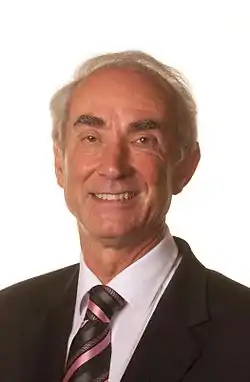Gerd Leers | |
|---|---|
 Gerd Leers in 2010 | |
| Mayor of Brunssum | |
| Assumed office 1 January 2018 Ad interim | |
| Preceded by | Luc Winants |
| Minister for Immigration and Asylum Affairs | |
| In office 14 October 2010 – 5 November 2012 | |
| Prime Minister | Mark Rutte |
| Preceded by | Office established |
| Succeeded by | Office discontinued |
| Mayor of Maastricht | |
| In office 1 February 2002 – 1 March 2010 | |
| Preceded by | Philip Houben |
| Succeeded by | Jan Mans (Ad interim) |
| Member of the House of Representatives | |
| In office 4 September 1990 – 1 February 2002 | |
| Parliamentary group | Christian Democratic Appeal |
| Personal details | |
| Born | Gerardus Bernardus Maria Leers 12 July 1951 Kerkrade, Netherlands |
| Political party | Christian Democratic Appeal (from 1980) |
| Other political affiliations | Catholic People's Party (1976–1980) Labour Party (1975–1976) |
| Spouse |
Genoveef Poelmans (m. 1977) |
| Children | 3 children |
| Residence(s) | Maastricht, Netherlands |
| Alma mater | Radboud University Nijmegen (Bachelor of Architecture, Bachelor of Economics, Master of Economics) |
| Occupation | Politician · Civil servant · Accountant · Researcher · Management consultant |
Gerardus Bernardus Maria "Gerd" Leers (born 12 July 1951) is a Dutch politician of the Christian Democratic Appeal (CDA) party. He is the acting Mayor of Brunssum since 1 January 2018.
Biography
Politics
On 4 September 1990 Leers became a Member of the House of Representatives. He was a member of the permanent parliamentary commission for transport and water management. The political peak in his House of Representatives period was the Betuwe route, of which Leers was a strong proponent. However, he was also involved in a construction fraud scandal.
Leers became Mayor of Maastricht on 1 February 2002 after Karl Dittrich withdrew his candidacy. In 2008, he stood for mayor of The Hague and of Rotterdam. As mayor Leers took strict measures, such as the raid on the travellers camp Vinkenslag and stopping the subsidy to the football club MVV. He also was against amnesty for failed asylum seekers. In late 2004 Leers was chosen as best mayor of the Netherlands. This choice came after a conflict with the civil service, after heavy criticism from Leers.
Leers also gained attention for his attitude with respect to the policy on soft drugs. He criticised the tolerance policy that permits consumption and sale of marihuana and hashish, but prohibits its growing. Leers argued for legal production under government supervision, which would supposedly improve quality and therefore the public health . Leers also proposed the construction of a "weed boulevard" on the south side of Maastricht, so that drugs tourists would no longer cause trouble in the city centre. However, this proposal was rejected.
In January 2010, he resigned from office after an affair concerning a holiday villa project in Byala, Bulgaria.[1] It was alleged that he was involved in shady deals to raise the value of villas he had ownership of.
On 14 October 2010 he became the new Minister for Immigration and Asylum Affairs in the first Rutte cabinet.
Decorations
| Honours | ||||
| Ribbon bar | Honour | Country | Date | Comment |
|---|---|---|---|---|
| Officer of the Order of Orange-Nassau | Netherlands | 7 December 2012 | Elevated from Knight (2002) | |
References
- ↑ "Maastrichtse burgemeester Leers stapt op" [Maastricht mayor Leers resigns]. NU.nl (in Dutch). ANP. 14 January 2010.
External links
- Official
- (in Dutch) Drs. G.B.M. (Gerd) Leers Parlement & Politiek